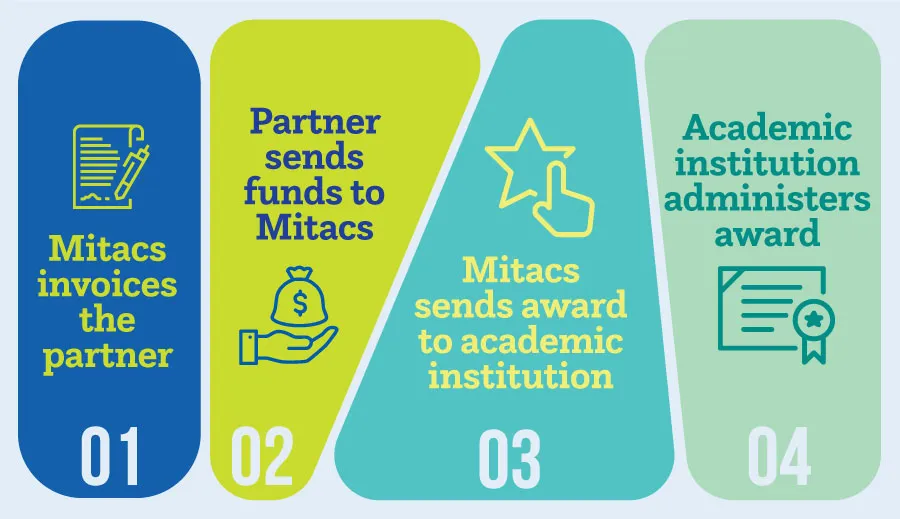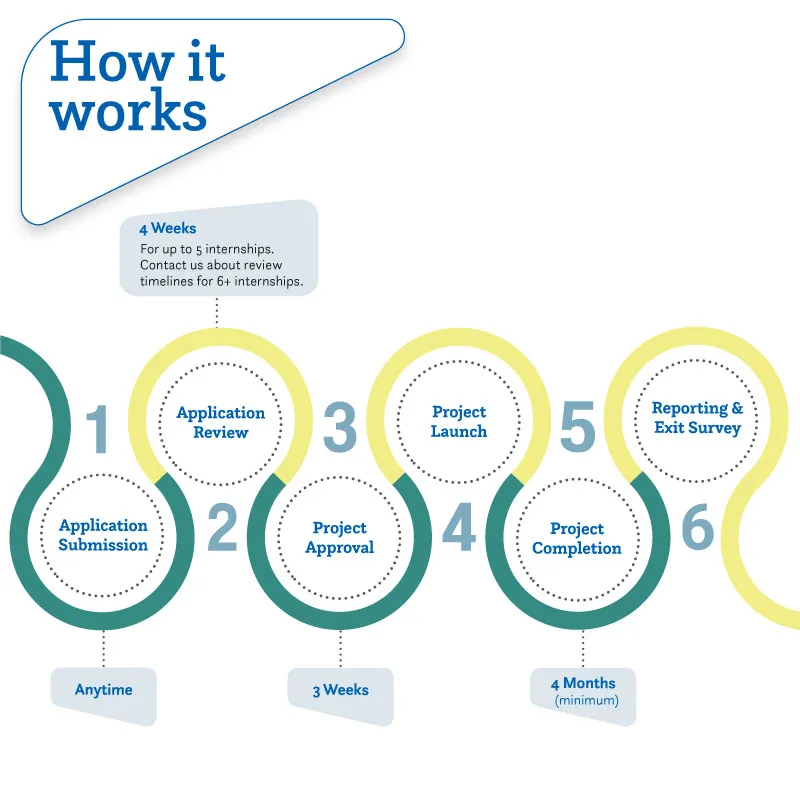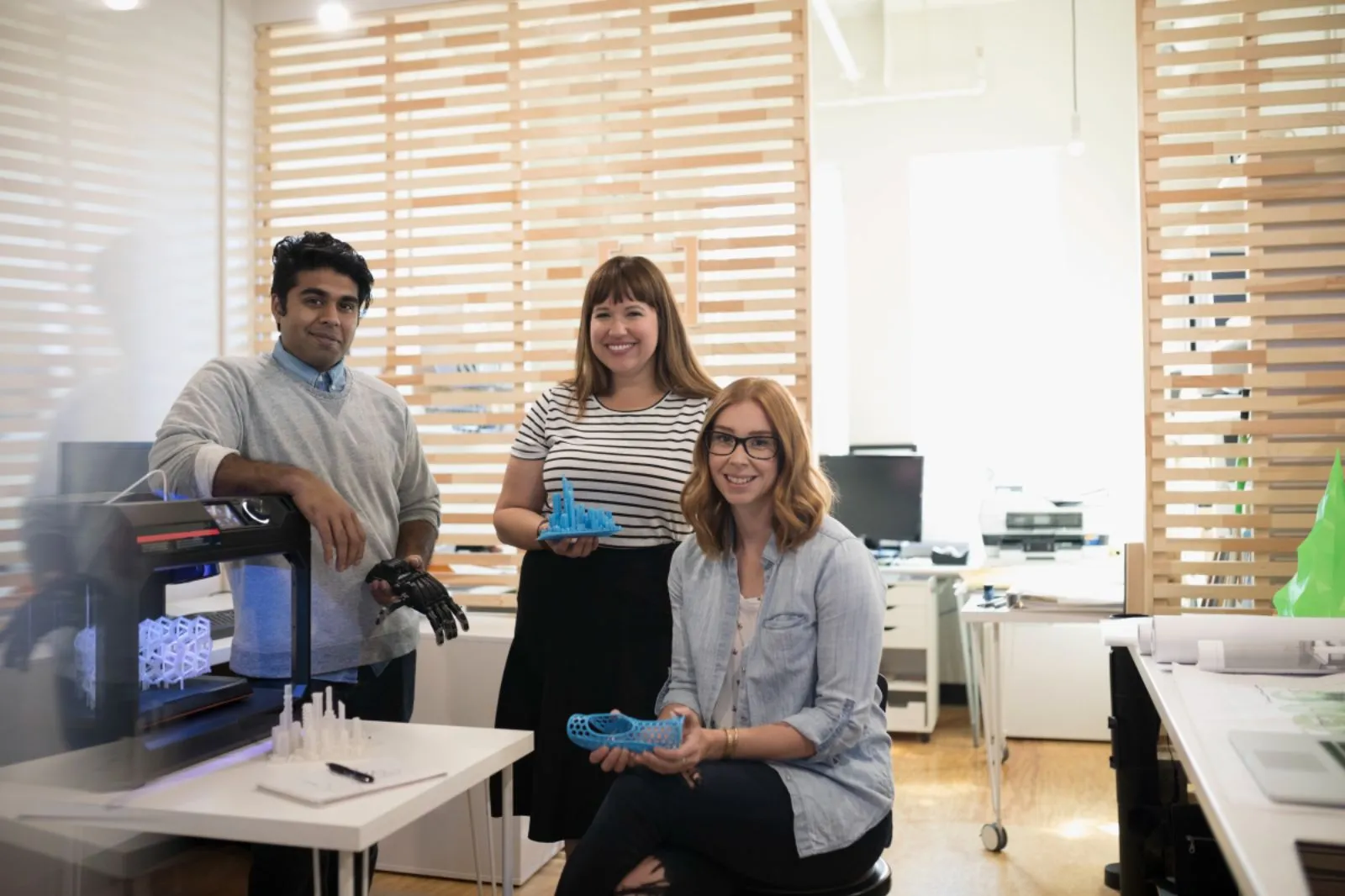Mitacs invoices a partner organization upon submission of their BSI proposal. Upon receipt of the partner’s contribution, Mitacs forwards the award to the Canadian academic institution. No funds will be released to the academic institution until the invoice has been paid and the proposal is approved. Mitacs has no control over when funds are administered by the academic institution. If you have questions about your BSI award after Mitacs has released funds, contact your academic institution’s Office of Research Services (or equivalent).

Project Start Date Requirements
Accelerate and BSI projects must begin after their research review is complete and approval has been granted. Generally, projects should start within one year of the receipt of research approval.
Accelerate and BSI internship units should not start until both the research review approval has been obtained AND the partner organization funds have been received at Mitacs. Individual internship start dates will not be confirmed by Mitacs staff until the receipt of the partner funds.
Project End Date Requirements
Participants will be notified as the end date of their project is approaching and must request an extension to Mitacs.
Accelerate and BSI project end dates can be extended by one year past the original projected end date. If any internships within a project have not been completed within this time, including units without a named intern (TBD units), those internships may be subject to cancellation.
Applicants can adjust internship start dates with named interns as long as the project is completed by either the original end date in the approved proposal or the extended end date granted by Mitacs.
These rules do not affect current policies regarding when the funds of an individual internship unit can be spent.
Mitacs takes no position on intellectual property (IP).
IP is to be shared between the academic institution, its researchers, and the partner organization according to the academic institution’s IP rules, unless a separate agreement is negotiated.
Mitacs can facilitate IP discussions with any Canadian academic institution. The following academic institutions have their own IP policies for Mitacs projects. For other institutions, please contact your Business Development representative.
Note that these IP agreements may not apply to joint applications with other funding organizations.
All submitted Business Strategy Internship (BSI) applications are reviewed for project quality, eligibility, and completeness. You will be notified by Mitacs if your application is ineligible or incomplete within four weeks of submitting your application. Please refer to the submission checklist below for more information.
Mitacs will also assess the benefits of the proposed activity in terms of the economic and societal impact of the project; the development and deployment of talent; and the establishment and support of collaborations. A project does not need to demonstrate benefits under every category (project, talent, and collaboration) since a weakness in one category can be compensated by strengths in another. However, projects that demonstrate little or no benefit across all categories will not be approved by Mitacs.
In addition to assessing the benefits of a project, each project will also be reviewed to ensure that it does not pose any unmanageable risks in the categories of feasibility, loss of talent or international assets from Canada, economic and national security risks, and adverse effects on humans, animals, and/or the environment. Projects involving high risk must demonstrate correspondingly high benefits to Canada and appropriate risk mitigation measures to justify approval by Mitacs.
While the selection process is not currently competitive, if funding does become limited, Mitacs will prioritize approval based of the potential cumulative benefits on the proposed activity.
Submission Checklist
Requirements for all projects
- The description of the why (background), the what (objectives), the how (approach), and the when (timeline with deliverables)
Requirements for all collaborations
- Objectives must be aligned with the knowledge, skills, expertise and needs of all involved.
- Each party’s roles and responsibilities must be clear to all signatories on the application.
- Each party’s expectations on deliverables, priorities, and time sensitivities must be clear to all signatories on the application.
- Agreement on intellectual property rights, ownership, and royalties must be clear to all signatories on the application.
Requirements for all internships
- A structure is in place to provide academic support that is appropriate to the level of the intern(s).
- There must be sufficient support / supervision from the internship host.
- There must be sufficient capacity at the internship host to manage the planned number of interns.
Requirements for all projects involving Indigenous peoples or communities
- These must have the support of the affected communities and those who have rights or a stake in the endeavor.
- Indigenous communities should have been involved in shaping the project from inception, and Elders and Knowledge holders should have been directly engaged.
- There must be clear agreement on Indigenous communities’ access, use, and governance of resulting knowledge and data.
- The project team must demonstrate the capacity to engage with Indigenous communities or partners in line with appropriate guidelines, principles, and policies. For more information please refer to our Indigenous Research Policy (found in the downloadable General Mitacs Terms, Conditions & Policies zip file in the How To Apply section).
Project
Examples of how a project can demonstrate the potential for economic and societal impact include, but are not limited to:
- creating or commercializing Canadian technology / intellectual property
- discovering new and broadly applicable knowledge
- enhancing Canadian productivity by developing new and improved processes
- supporting the entry of Canadian businesses into new domestic / international markets
- developing new business models for Canadian companies
- improving public services (e.g. transportation infrastructure, utilities, healthcare) in Canada
- contributing new solutions to community challenges in Canada
- addressing social or environmental issues important to Canadian society
- advancing new approaches to include under-represented groups in the knowledge economy
- working towards a more equal and equitable Canada
- implementing evidence-informed strategies to address a specific challenge
Talent
Examples of how a project can demonstrate the potential for supporting the development of a talented and skilled population include, but are not limited to:
- interns gaining specialized technical skills through access to and training on the use of specialized equipment and facilities
- training interns in research skills
- training interns in interdisciplinary teamwork
- training interns in community-based methodologies
- training interns in entrepreneurial / professional skills through structured activities
- creating opportunities for interns to apply their knowledge / skills and solve industry / real-world problems
- re-skilling / up-skilling interns to pursue new and emerging opportunities in Canada
- placing interns in positions (at Canadian companies or organizations) appropriate to their training / skills
- interns being introduced to new professional experiences / environments / contacts / networks in Canada
- supporting individuals from under-represented groups in the knowledge economy
Collaboration
Examples of how a project can demonstrate the anticipated benefits associated with collaboration include, but are not limited to:
- bringing people together to solve problems through complementary skills and expertise
- sharing access to data, facilities, instruments for mutual benefit
- exchanging knowledge among academia, industry, communities
- moving tacit knowledge into practice through interdisciplinary teamwork
- supporting long-term relationships among academia, industry, communities
- establishing new collaborations among academia, industry, communities
- attracting foreign investment, talent, and innovative companies to Canada
- creating partnerships with communities that are under-represented in the knowledge economy
- linking Canadian researchers to prominent research groups globally
















